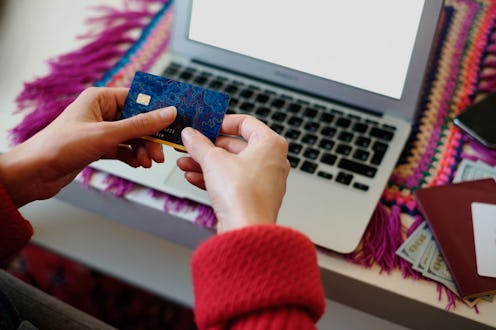Life
Shopping Addiction Needs To Be Taken More Seriously, Say Experts

When healthcare group The Priory added shopping addiction to its list of treatable conditions, people paid attention. But compulsive buying disorder, or oniomania as it is sometimes known, has been a real thing for quite some time. And it affects more people in the UK than you think. So what is shopping addiction, how do you recognise the symptoms, and, more importantly, how can you treat it?
A 2015 review found around one in 20 people living in developed countries may exhibit compulsive buying behaviour. According to Pamela Roberts, addiction programme manager at the Priory Hospital in Woking, it is "believed to affect 8 to 16 percent of the UK population."
Often trivialised, the condition "can be devastating and its wider negative impacts can be shocking," says Roberts. Feeling the need to shop over and over again can quickly spiral into debt and cause relationship and family issues. Further disruption can come from the sheer amount of time and effort spent shopping (online and IRL) and returning items.
Carrie Rattle, money coach and founder of Behavioural Cents, notes that compulsive shopping is different from impulsive shopping. "Impulsive shopping is sparked by external triggers such as sales, beautiful merchandising, fear of missing out," she tells me. "Compulsive shopping is sparked from within oneself."
Rattle explains that compulsive shoppers will feel a "high" when shopping followed by a quick emotional crash that fuels them to buy all over again. But, as consumer psychologist Dr. Cathrine Jansson-Boyd writes in The Conversation, there is debate over what causes this behaviour along with how the disorder should be defined.
The neurotransmitter dopamine surges when we think about buying something new, reports Elle, rising even more when we actually hit the check out button. For some people though, the balance between this and self-control becomes off-kilter, notes Roberts.
"Any addiction is a way of coping with emotions," she adds. "If you’re overloaded with work, for example, you feel you deserve a treat. If you become reliant on that 'hit', it can develop into a negative habit, whereby your response to stress is always to buy something." Having access to every store at your fingertips doesn't help such compulsion.
There are several ways to recognise a compulsive shopper, says Rattle. Clothing bearing the price tag months or years after purchase is a warning sign along with multiples of the same item. Spending an inordinate amount of time scrolling through shopping sites, trying to hide purchases and/or bank statements, and lavishing others with unnecessary gifts are also signs to look out for.
"It is worth noting that treatment has not been well delineated," Dr. Jansson-Boyd tells me, "because we don't yet have a clear definition or indeed a diagnostic criteria." Cognitive behavioural therapy (CBT) is commonly used and serotonin reuptake inhibitors "can help some CBD patients to regulate their buying impulses." But there needs to be more research to find what works best.
Another option, according to Roberts, is dialectical behaviour therapy (DBT). This can help manage shopping urges "by incorporating a mixture of group-based skills training and individual therapy involving mindfulness and emotional regulation."
However, "relatively few sufferers of compulsive buying disorder seek psychiatric treatment," says Dr. Jansson-Boyd. Probably because people think of it as solely a financial issue. In that case, following a programme from the likes of Debtors Anonymous can help.
Dr. Jansson-Boyd lays out a few helpful tips for coping at home. First, determine your triggers by looking "at why and how your shopping initially became a problem." Then when you feel a desire to buy, do something else.
Throw away credit cards and shop using only cash to get a better idea of what you're spending. Ultimately, she says, "remind yourself that the purchases you make will only initially provide you with extra pleasure but that it will not last as the extra pleasure wears off."
Instead of treating shopping addiction as a comedic female-only act, experts say we need to recognise it as a serious disorder. Not only will this fuel further research but it will help people come forward and get the treatment they need.